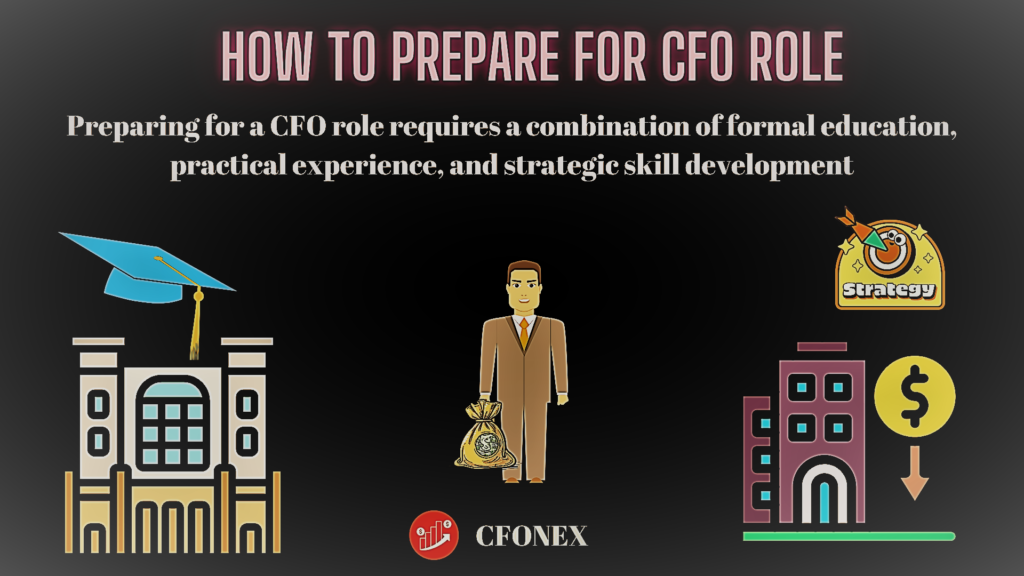Preparing for a CFO role requires a combination of formal education, practical experience, and strategic skill development.

How to Prepare for a CFO Role?
Preparing for a CFO role requires a combination of formal education, practical experience, and strategic skill development. Here’s a step-by-step guide to help you prepare for this high-level position:
1. Educational Background
- Obtain Relevant Degrees: A bachelor’s degree in finance, accounting, economics, or a related field is essential. Many CFOs also hold advanced degrees, such as an MBA or a master’s in finance or accounting.
- Professional Certifications: Earning certifications like Certified Public Accountant (CPA), Chartered Financial Analyst (CFA), or Chartered Accountant (CA) can enhance your credibility and demonstrate your expertise in financial management.
2. Gain Relevant Experience
- Start in Finance Roles: Gain experience in various finance roles such as financial analyst, accountant, or controller. Understanding the fundamentals of financial reporting, budgeting, and forecasting is crucial.
- Progress to Management Positions: Move into managerial roles within finance, such as finance manager or director of finance. This experience will help you develop leadership skills and learn how to manage a finance team.
- Experience with Strategic Planning: Get involved in strategic planning and financial analysis projects. This experience will prepare you for the strategic aspects of the CFO role.
3. Develop Key Skills
- Leadership and Management: Build strong leadership skills to effectively manage a finance team and collaborate with other senior executives. Seek out leadership training or mentoring opportunities.
- Strategic Thinking: Develop your ability to think strategically about the company’s financial position and long-term goals. Engage in projects that require strategic planning and decision-making.
- Communication Skills: Hone your ability to communicate complex financial information clearly to various stakeholders, including the board of directors, investors, and employees.
- Analytical Skills: Strengthen your ability to analyze financial data, identify trends, and make data-driven decisions.
4. Build a Strong Professional Network
- Network with Industry Professionals: Build relationships with other finance professionals, including current CFOs, financial analysts, and consultants. Networking can provide valuable insights and open up opportunities for mentorship and career advancement.
- Attend Industry Events: Participate in industry conferences, seminars, and workshops to stay updated on trends and best practices in finance and accounting.
5. Stay Informed on Industry Trends
- Follow Financial News: Stay current with financial news, market trends, and changes in regulations. Understanding the broader economic environment will help you make informed decisions.
- Continued Education: Engage in ongoing learning through courses, webinars, and professional development programs to keep your knowledge up-to-date.
6. Seek Out Mentorship and Guidance
- Find a Mentor: Seek a mentor who is an experienced CFO or financial executive. They can provide guidance, share their experiences, and offer valuable advice on preparing for the role.
- Get Feedback: Regularly seek feedback on your performance and areas for improvement. This will help you refine your skills and prepare for more senior roles.
7. Prepare for the CFO Role Specifically
- Understand CFO Responsibilities: Familiarize yourself with the specific responsibilities and challenges of the CFO role. This includes financial strategy, risk management, compliance, and stakeholder communication.
- Develop a Strategic Vision: Work on developing a strategic vision for financial management that aligns with organizational goals. This will be crucial in guiding the company’s financial direction.
8. Gain Experience with External Relations
- Work with Investors and Analysts: Experience in investor relations or interacting with financial analysts can be valuable, as CFOs often need to communicate the company’s financial health and strategy to external stakeholders.
By following these steps, you can effectively prepare for a CFO role and position yourself as a strong candidate for this pivotal position within an organization.
Leave a Reply